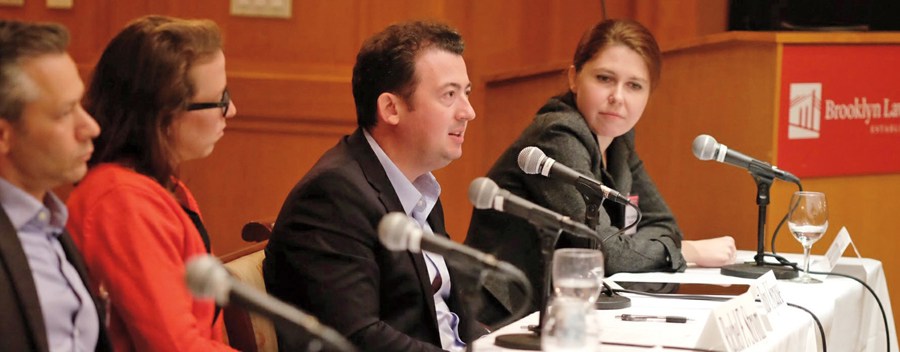
Panelists discussed the potential game-changing impact of blockchain
On Oct. 19, the Center for Urban Business Entrepreneurship (CUBE) held a panel discussion—“What’s the Big Deal with Big Data?”—that explored the legal and policy challenges facing technology startups.Sponsored by Ultimate Software Group founder Robert J. Manne ’77 (see Q&A) and Grace N. Manne and moderated by Professor Christina Mulligan, the panel touched on the privacy implications of gathering large amounts of data and the potential game-changing impact of blockchain, a distributed database of transactions or information transfers that cannot be altered, only amended.
The panel included Solon Barocas, postdoctoral researcher at Microsoft Research’s New York City Lab; Dimitri Nemirovsky ’00, cofounder of Reyhani Nemirovsky and Vida Identity; Rachel F. Strom, a partner with Levine Sullivan Koch & Schulz; and Dana V. Syracuse ’04, senior counsel at Perkins Coie.
The panelists agreed that so much change is happening in the world of data collection and security that lawyers who choose to work with any company that touches data will face many challenges.
“People are preoccupied with the size and scope of data, but there is a shift in interest to the tools we use to make that data useful,” said Barocas. “This is a new area of policy distinct from privacy and security, and there’s a thirst for meaningful advice on these issues.”
Barocas discussed his research on how data might be able to answer questions about bias, discrimination, and fairness. There is enthusiasm that using artificial intelligence for such tasks as making hiring decisions might stem bias, he said, but gathering the amount of data that would be needed for such an operation can be expensive and create its own ethical problems.
Nemirovsky said his company hopes to use blockchain to transform the way people think about identity. Blockchain is most commonly known for facilitating the use of the cryptocurrency Bitcoin, but it also could allow people to access and share information about themselves securely without relinquishing control of it to third parties.
“From a legal standpoint, a lot of use cases for blockchain are only now coming to light,” Nemirovsky said.
Strom, whose firm represents media clients, including Gawker Media in Hulk Hogan’s invasion of privacy case, emphasized the importance of data-savvy attorneys in the current landscape. She advised the Guardian on its Edward Snowden data dump and several publications on coverage of the Sony and Ashley Madison hacks.
Syracuse explained the value that blockchain innovations will have for healthcare data companies. The law is still adapting to this new phenomenon, he said, but “there is ample law that exists for many use cases that we can look to for guidance.”
Watch a video of the panel here: brooklaw.edu/bigdata